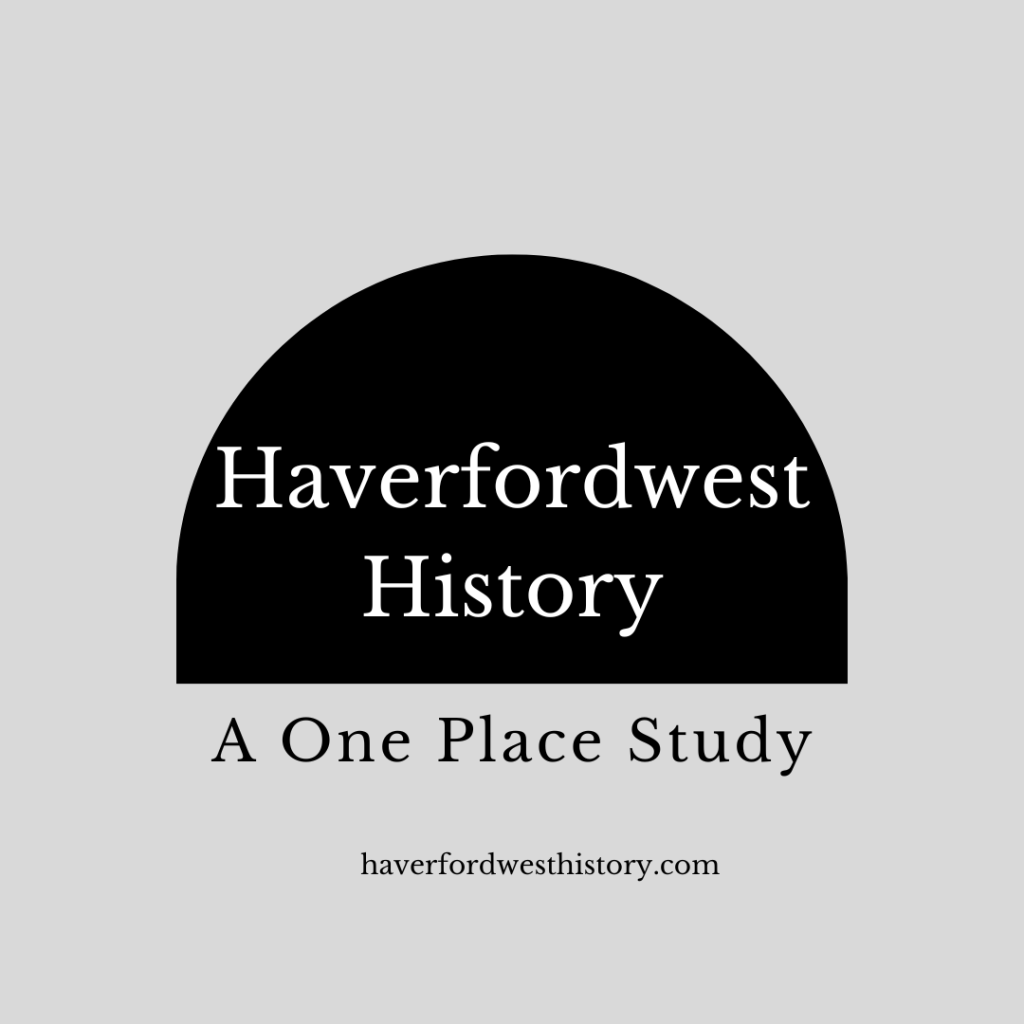The Blogging from A to Z April Challenge is for bloggers who wish to participate, by publishing a blog post every day in April except for Sundays. Each blog post will focus on a letter of the alphabet. For example April 1 will be A, April 2 will be B, April 3 will be C, and on it goes. By the end of April, a blog post for every letter of the alphabet will have been published. Blog posts are usually on a theme, or you can choose to post each day with no theme at all. My theme for 2024 is “Haverfordwest in the News”. Haverfordwest is a town in the county of Pembrokeshire, Wales.

from: South Wales Daily News, Wednesday 29 December, 1875, page 5
Official Religion in Haverfordwest
Advancing backwards seems to be the unhappy characteristic of sleepy towns and slow villages. This perhaps is only the resultant of a universal law as operative in social and political life as in physics and philosophy. Reaction is not only the consequence of, but is ever equal to, action. The pendulum rises only to fall to it’s lowest level, before it rises again. The tide flows, but it also ebbs. The oaks of the forest flourish and decay, and give birth to fresh vegetation, which in it’s turn withers. Is this but a similitude of social progress? Does it also reach a definite advance only to recede? It is a pitiable and disheartening doctrine, and yet it finds support in the doom of past civilizations, and in the history of many existing communities.
Some towns rise to a certain altitude and then are suddenly checked. This is sometimes attributable to surrounding causes palpably operating to produce the result. The growing prosperity of a community may be commercially stopped by the construction of a new road or a railway carrying the stream of traffic outside it’s borders, so that the flow of trade passes by without reaching it. Towns lying beyond the great thoroughfares of public thought and opinion receive no innoculation from the progressive spirit of the age, and seem to become more sluggish, sleepy and reactionary during the otherwise universal reawakening.
All this is too common to cause surprise or to call for remark. But it is an unusual spectacle, and not a very encouraging one to those who believe in the continuing progress and future perfection of society – to witness a town which had made hopeful and absolute advance deliberately, through it’s representatives, recanting it’s progressive creed; abandoning the character which had won for it, a name and a repute amongst other towns; disowning it’s former enlightened professions and returning to the darkness, out of which it had emerged.
Such cases are not common, although they do occasionally happen, but it is almost incredible that in such a town as Haverfordwest , the Mayor and a portion of the Town Council could ever have ventured upon the attempt to commit the sturdy little Pembrokeshire borough – the once champion of civil and religious freedom – to a retrograde and reactionary policy.
A paragraph published in yesterday’s South Wales Daily News, stated that at a special meeting of the Haverfordwest Town Council, convened to consider the advisability of reviving the ancient custom of the Council attending Divine Service at St. Mary’s church on Christmas Day. The Mayor said, “he wishes to revive the custom alluded to”.
Old customs, however meaningless, however perverting, however pernicious, are, as all social and religious reformers know, most difficult to eradicate, but when they have been once uprooted, and new, more rational, and more defensible customs introduced, it does surprise, not a little, to see intelligent men, wishful to return to a long exploded tradition.
Where the traditional custom has survived the advance of intelligence, and official men are still impenetrable to the essential distinction between ecclesiasticism and religion, superstitions will still linger, and will cling to the official robe like burrs to the skirts of unwary travellers.
But official religion in Haverfordwest was discountenanced and discredited more than a third of a century ago, when Mr. William REES, the first dissenting Mayor of the Borough, after the passing of the Municipal Corporations Act, refused to go officially to church, or to mock heaven with an ostentatious display of perfunctory and official worship.
Religion is either the language and the homage of the individual heart, or it is nothing. This is, we believe, a fundamental truth in the Creed of Dissenters and Nonconformists, and how Wesleyans and Baptists and Independants can think that they honour God, and reverence religion by going to St. Mary’s church – which on ordinary occasions, they never attend – surrounded by Municipal Display, and preceded by an official retinue of policemen and town bailiffs and sergeants-at-mace, wielding their insignia of office, puzzles men of ordinary intelligence.
Officialism in religion – a State system of worship – is either true or false. There is no middle decision; It cannot be true, on stated occasions or on special holidays, and false at all other times.
Most of the Haverfordwest Town Councillors who took part in the discussion whether they should accompany the Mayor to church or not, are, we understand, Nonconformists or Dissenters. Their religious profession is a standing and ever living protest against official and state religion, and yet they were prepared to consider whether on a most solemn occasion, they should not recognise and admit the truth of that official and state religion which they solemnly declare to be a falsehood and a wrong.
Mr. Joseph THOMAS stated that he would “be happy to go to church, if the council went in a body”. Mr. THOMAS was not however prepared to believe in official and state religion at the bidding of a minority; but if the majority, or rather, if the whole of the Town Council were willing to recognise the religion of State officialism, he would not be so discourteous as to dissent.
**Please note: Punctuation and paragraphs have been added to the above transcription for ease and speed of reading.
1875 OFFICIAL RELIGION IN HAVERFORDWEST, South Wales Daily News, Wednesday 29 December 1875, Page 5. Retrieved on 11 November 2023, from British Newspaper Archive



© 2024 Copyright. all rights reserved: haverfordwesthistory.com
Yes, I would think there was a bit of stirring up trouble there.
It seems provocative to have made the suggestion “of reviving the ancient custom of the Council attending Divine Service at St. Mary’s church on Christmas Day” when the community had a variety of religions practised in the town and presumably by members of the Council.
These reports also show how important religion was to the community.
Now that’s an interesting point.
A contentious issue. I wonder if the Councillors of today be discussing issues such as this.
Interesting to read about differing views on religion that far back.